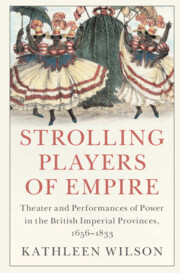Refine search
Actions for selected content:
2 results
Chapter 5 - Genders, Sexualities, and Decolonial Methodologies
- from Part I - Identities
-
-
- Book:
- Decolonizing the English Literary Curriculum
- Published online:
- 02 November 2023
- Print publication:
- 09 November 2023, pp 110-126
-
- Chapter
-
- You have access
- Open access
- HTML
- Export citation

Strolling Players of Empire
- Theater and Performances of Power in the British Imperial Provinces, 1656–1833
-
- Published online:
- 11 November 2022
- Print publication:
- 01 December 2022
